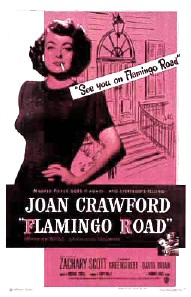Flamingo Road (film)
| Flamingo Road | |
|---|---|
 Theatrical release poster | |
| Directed by | Michael Curtiz |
| Screenplay by | Robert Wilder |
| Based on | Flamingo Road 1946 play by Robert Wilder Sally Wilder |
| Produced by | Jerry Wald |
| Starring | |
| Cinematography | Ted D. McCord |
| Edited by | Folmar Blangsted |
| Music by | Max Steiner |
Production company | Michael Curtiz Productions |
| Distributed by | Warner Bros. |
Release date |
|
Running time | 94 minutes |
| Country | United States |
| Language | English |
| Budget | $1,528,000[1] |
| Box office | $2 million[2] or $2,896,000[1] |
Flamingo Road is a 1949 American film noir drama directed by Michael Curtiz and starring Joan Crawford, Zachary Scott, Sydney Greenstreet and David Brian. The screenplay by Robert Wilder was based on a 1946 play written by Wilder and his wife, Sally, which was based on Robert Wilder's 1942 novel of the same name.[3]
The plot follows an ex-carnival dancer who marries a local businessman to seek revenge on a corrupt political boss who had her railroaded into prison. Some of the more salacious aspects of the novel were downplayed in the film because of the Hollywood Production Code.
Robert Wilder, who died in 1974, was later credited as the creator of the American TV series Flamingo Road (1980-1982), which drew elements from both the novel and the film.
Plot
Lane Bellamy is a carnival dancer stranded in the small town of Boldon City in the Southern United States. She becomes romantically involved with Fielding Carlisle, a deputy sheriff whose career is controlled by Sheriff Titus Semple, a corrupt political boss who runs the town. Semple dislikes Bellamy and mounts a campaign against her. She has difficulty finding work and is arrested on a trumped-up morality charge. Meanwhile, Carlisle is the political machine's choice for state senator, and to portray the perfect political family, he marries his long-time girlfriend, Annabelle Weldon.
Sad that the love of her life has divorced himself from her, Bellamy finds work as a hostess at a roadhouse run by Lute Mae Sanders. There, she meets Dan Reynolds, a businessman who supports the corrupt Semple so long as it is profitable. She charms Reynolds into marrying her and the couple moves to the town's best neighborhood, Flamingo Road.
As a kingmaker in the state, Semple decides to run Carlisle for governor and unseat the incumbent. This is too much even for Reynolds and now he decides to oppose Semple. When Carlisle, who has a weakness for alcohol, also begins to show his limits in cooperating with Semple, Semple flies into a rage and abandons him, destroying Carlisle's career. Then Semple makes himself the candidate. At this, Reynolds grows stronger in his opposition. So Semple arranges to have Reynolds framed.
Later a drunken Carlisle, who knows what's happening but feels the situation is hopeless, visits the mansion on Flamingo Road and commits suicide practically in front of Bellamy. This gives Semple another weapon in his bid to ruin Bellamy and her husband, who has now been indicted for graft. Bellamy confronts Semple with a gun and demands he phone the attorney general and confess everything, but a physical struggle ensues and she shoots him dead. At the end, Bellamy is in prison awaiting a ruling and Reynolds indicates he will stick by her.
Cast
- Joan Crawford as Lane Bellamy
- Zachary Scott as Fielding Carlisle
- Sydney Greenstreet as Sheriff Titus Semple
- Gladys George as Lute Mae Sanders
- David Brian as Dan Reynolds
- Virginia Huston as Annabelle Weldon
- Fred Clark as Dr. Waterson
- Gertrude Michael as Millie
- Tito Vuolo as Pete Ladas
- Alice White as Gracie
- Sam McDaniel as Boatright
Reception and box office
Howard Barnes wrote in the New York Herald Tribune, "Joan Crawford acquits herself ably in an utterly nonsensical and undefined part...It's no fault of hers she cannot handle the complicated romances and double crosses in which she is involved."[4] Bosley Crowther of The New York Times called it a "jumbled melodrama" in which Crawford robotically experiences a series of crises.[5] Variety described it as "a class vehicle for Joan Crawford, loaded with heartbreak, romance and stinging violence."[6]
According to Warner Bros. records, the film earned $2,263,000 in the U.S. and $633,000 in other markets.[1]
Home media
The film was released on VHS by Warner Home Video in 1998, which also issued it on DVD in 2008 as part of "The Joan Crawford Collection: Volume 2".
References
- ^ a b c Warner Bros financial information in The William Shaefer Ledger. See Appendix 1, Historical Journal of Film, Radio and Television, (1995) 15:sup1, 1-31 p 29 DOI: 10.1080/01439689508604551
- ^ "Top Grossers of 1949". Variety. 4 January 1950. p. 59.
- ^ Flamingo Road at the AFI Catalog of Feature Films.
- ^ Quirk, Lawrence J.. The Films of Joan Crawford. The Citadel Press, 1968.
- ^ Crowther, Bosley (May 7, 1949). "Flamingo Road (1949)". The New York Times. Retrieved February 20, 2015.
- ^ "Review: 'Flamingo Road'". Variety. 1949. Retrieved February 20, 2015.
External links
- 1949 films
- 1949 drama films
- American films
- American drama films
- English-language films
- American black-and-white films
- Film noir
- Warner Bros. films
- Films adapted into television shows
- American films based on plays
- Films based on American novels
- Films directed by Michael Curtiz
- Films scored by Max Steiner
- Films based on adaptations
